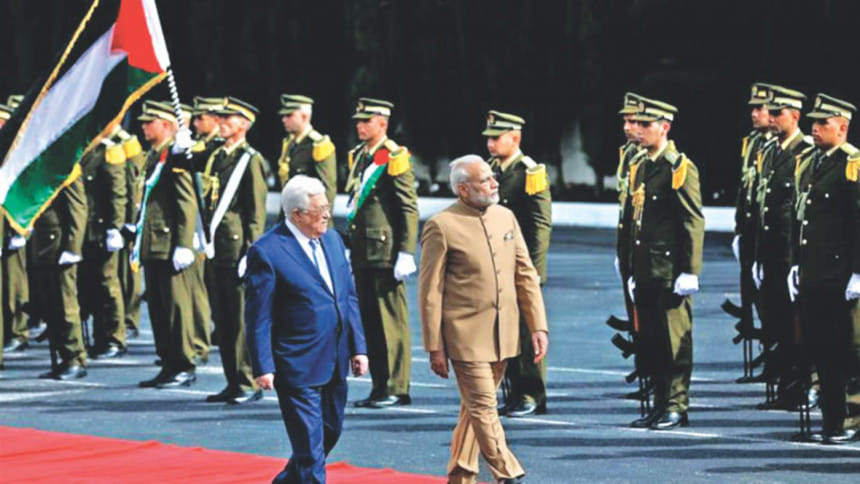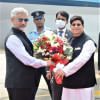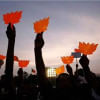'Contemporary India: Its foreign policy, security and development strategy'

India's foreign and security policy imperatives are underpinned by the desire to achieve sustained and inclusive economic growth. The focus is on creating an enabling environment for national growth and development by maintaining peace and stability; securing access to resources and playing a constructive role in shaping the agenda and debate on issues of global interest.
Under the government of Prime Minister Narendra Modi, our foreign policy has become more proactive and has acquired a renewed energy, vigour, and planning in the ways India engages with the rest of the world.
One of the most important aspects of our foreign policy has been the adoption of a "Neighbourhood First" approach. This is reflected in frequent high-level exchanges; heightened focus on connectivity and economic integration to facilitate the movement of goods and people; and commencement of cooperation in previously uncharted areas.
Deepening our global engagement is an important prerequisite for economic development and consensus building on issues of global importance. Recognising this, our diplomatic outreach in the last four years to our international partners has been unprecedented. High level visits have taken place to more countries revitalising India's diplomatic engagements across continents, including first-ever visits to Palestine, Mongolia, Portugal, and most recently, Rwanda. Other firsts, include participation of leaders of all 54 African countries in the third India-Africa Forum Summit; all 10 ASEAN heads at India's Republic Day; upgradation of the "Look East" Policy to "Act East"; enhancement of economic and strategic ties with West Asia; convening the "Forum for India-Pacific Islands Cooperation" (FIPIC) Summit; visit of PM Narendra Modi to all five Central Asian Countries in one tour; and the India-Nordic Summit.
India is also seriously committed to taking regional cooperation forward through the BBIN and BIMSTEC. The successful trial run of a passenger bus service from Dhaka to Kathmandu via Siliguri last April was a significant step towards operationalising the BBIN Motor Vehicles Agreement. We attach high importance to BIMSTEC as it touches upon two major aspects of our foreign policy—"Neighbourhood First" and "Act East" and look forward to the BIMSTEC Summit that will take place in Kathmandu later this month.
Perhaps the most significant trend in Indian foreign policy has been the realignment of our diplomatic efforts in the last four years to meet the needs of the development agenda of the government. By way of background, the government has embarked upon a mission to transform India and launched several flagship schemes such as Make in India, Smart Cities, Skill India, Digital India, etc. The government has also embarked on several liberalisation and reform measures to improve the ease of doing business in India. Last year, India rolled out the Goods and Services Tax—the biggest tax reform since its independence.
Our international outreach, led by the PM himself, has been carefully tailored and directed to create the most propitious climate for domestic growth, including by working towards a regional security environment that allows us to focus on our economic goals. This unprecedented outreach to our international partners has contributed to an increase in investments, access to new technology, securing resources for India, development of modern infrastructure and bringing foreign expertise for flagship schemes. As a result, "Diplomacy for Development" has become one of the defining features of India's foreign policy.
India also continues its policy of sharing its developmental experience with other developing countries. This was seen most remarkably in several different initiatives in the neighbourhood, which included the largest ever Line of Credit (of USD 5 billion) extended by India to Bangladesh or to any other country during the visit of Prime Minister Sheikh Hasina to India last year. India also announced a USD 10 billion Line of Credit for Africa during the third India Africa Forum Summit; and is implementing significant developmental projects in countries such as Mauritius, Seychelles, Jordan, Palestine and Mongolia.
In his keynote address at the Shangri-La dialogue recently, Prime Minister Narendra Modi remarked that we are living on the "edge of uncertainty, of unsettled questions and unresolved disputes; contests and claims; and clashing visions and competing models." He also talked about cross-border challenges, including the threat of terrorism and extremism and called for rising above divisions and competition to work together.
In this context, India has been a proactive and constructive contributor to shaping of the global agenda and debate on issues such as terrorism, climate change, nuclear proliferation and global governance reform. There has been increased support for India's efforts to isolate terrorists and their sponsors, manifest in the universal support for Prime Minister Modi's 11-point action plan on combating terrorism at the G-20 Summit in Hamburg. Bangladesh has also faced some serious challenges from terrorism and is an invaluable partner in our fight against terrorism. In recognition of India's impeccable non-proliferation record and its rise as a responsible global actor, India gained entry into three key global export control regimes (MTCR, Wassenaar Arrangement, Australia Group).
We are committed to the ethos of environmental protection and conservation and are well on the way to fulfilling our commitment of meeting 40 percent of our electricity capacity from renewable energy sources by 2030. India, together with France, led the successful launch of the International Solar Alliance (ISA), which has created a platform of 121 partner countries to promote development of solar energy projects worldwide. The ISA will help mobilise investments of over USD 1 trillion that will help it install over 1,000 GW of solar generation capacity worldwide by 2030.
At the Shangri-La dialogue, Prime Minister Modi also talked about the inclusive nature of our approach to engagement in the Indo-Pacific region—from the shores of Africa to that of the Americas. He outlined our vision for the Indo-Pacific region which we do not see as a grouping of limited members that seeks to dominate or that is directed against any country. Our vision for the Indo-Pacific includes a free, open and inclusive region; centrality of Southeast Asia; a common rules-based order through dialogue; freedom of navigation, unhindered commerce and peaceful settlement of disputes in accordance with international law; an open, rules-based and stable trade regime; and improved connectivity. However, connectivity initiatives must be based on respect for "sovereignty and territorial integrity, consultation, good governance, transparency, viability and sustainability", and should not place countries under any debt burden. He further outlined the five basic principles on which India's engagement with the world will be based. These are five Ss in Hindi: "samman (respect)"; "samvad (dialogue)"; "sahyog (cooperation)"; "shanti (peace)"; "samriddhi (prosperity)".
India and Bangladesh have made huge strides forward in our respective efforts at achieving economic development and growth. Our initiatives to take the bilateral relationship forward in recent years has proven that cooperation can yield the results that our people desire—a win-win dividend for countries as proximate as ours. India, Bangladesh and other countries in the region, which share common values and developmental goals, can ensure that the GenNext, which accounts for a major part of our populations, can expect to see a more just, equitable and accessible global order. One we can work together to achieve.
Harsh Vardhan Shringla is High Commissioner of India to Bangladesh.
This article is based on an address yesterday by the High Commissioner to the National Defence College, Mirpur.









Comments